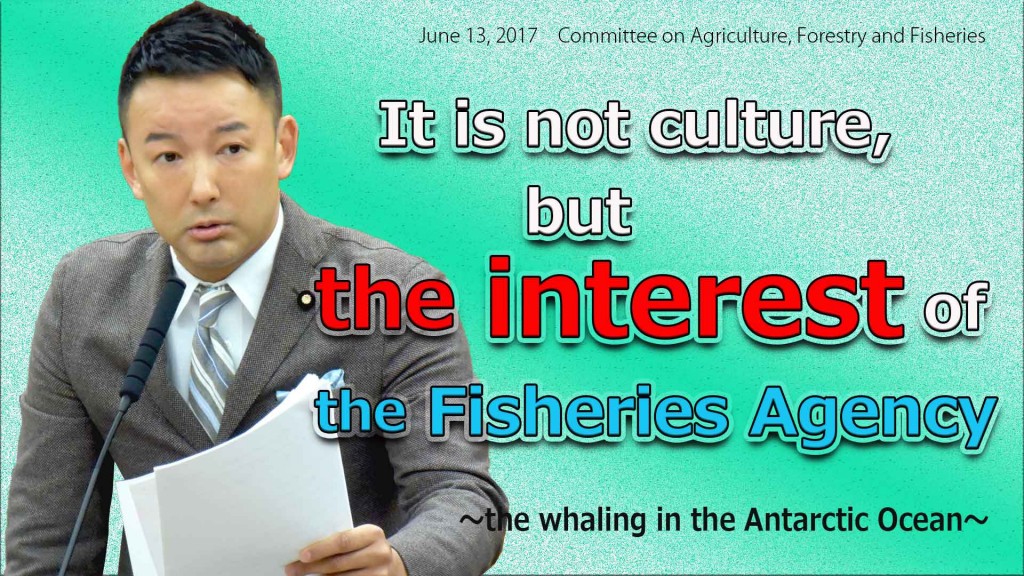We Oppose Japan’s Withdrawal from the IWC
- Details
- Created on Sunday, 30 December 2018 08:16
December 28th, 2018
Iruka & Kujira (Dolphin & Whale) Action Network
On December 26th 2018, the government of Japan officially announced that it will withdraw from the International Whaling Commission (IWC), an organizational body for executing the International Convention for the Regulation of Whaling (ICRW). The government stated it will cease research whaling in high seas and resume commercial whaling in coastal waters and in the Exclusive Economic Zone (EEZ) from July 2019.
The government of Japan insists that the reason for the withdrawal is the dysfunction of the IWC and the mass media is reporting this viewpoint. However, Japan has other reasons to discontinue research whaling and these factors all attribute back to the government itself: cost measures for refurbishing the deteriorating whaling factory ships, declining demand for whale meat, and Japan’s violation of the Washington Treaty.
Stop Issuing “Introduction from the Sea” Certificates; Stop Distributing Sei Whale Meat
- Details
- Created on Wednesday, 14 November 2018 01:01
November 5th, 2018
Prime Minister Shinzo Abe
Minister of Foreign Affairs Taro Kono
Minister of Agriculture, Forestry and Fisheries Takamori Yoshikawa
- The Standing Committee of the Convention on International Trade in Endangered Species of Wild Fauna and Flora (CITES) recognized by consensus that Japan’s introduction from the sea of sei whales was not in compliance with the Convention that forbids commercial distribution of species listed in the Appendix I, at its 70th meeting held in Sochi, Russia, on October 2nd.
- At the Standing Committee, the government of Japan, acknowledging the content of the report submitted by the CITES Secretariat, committed to take remedial actions by February 2019, report the measures to be assessed by the next Standing Committee, and not authorize any certificates for introduction from the sea of sei whales.
- Japan has harvested a total of 1622 sei whales to date from the high seas in the western North Pacific, landing approximately 1400 tons of sei whale meat every year for consumption, which are vacuum packaged and frozen onboard, in addition to specimens used for scientific research. This practice that has been in place since 2002, however, is now agreed it is a violation of the Convention.
Joint Statement NGOs call on Japanese Government to: Comply with CITES and Stop Distributing Sei Whale Meat
- Details
- Created on Thursday, 12 April 2018 12:23
Prime Minister of Japan
Shinzo Abe
Minister of Foreign Affairs of Japan
Taro Kono
Minister of Agriculture, Forestry and Fisheries of Japan
Ken Saito
Minister of Environment of Japan
Masaharu Nakagawa
Most of the member countries at the committee denounced Japan, saying that bringing sei whale meat into the country is a violation of the treaty, and that this warrants a measure such as suspension of trade. None of the members supported Japan’s claims that it does not constitute a violation of the treaty.
The final decision will be taken at the Standing Committee meeting in October 2018. By the next Committee, in order to verify whether any violation of the treaty has occurred, the Secretariat will ask additional questions of Japan regarding those Japan previously failed to answer. Upon receiving the answers, the Secretariat will dispatch an investigation team to Japan.
We Oppose Japan’s “IWC Reform” Proposal
- Details
- Created on Friday, 07 September 2018 21:25
You can download pdf file of following leaflet.: ![]() (250KB)
(250KB)
It's not culture, but the interest of the Fisheries Agency
- Details
- Created on Saturday, 29 July 2017 09:58
An interpellation regarding Japanese whaling at the Committee on Agriculture, Forestry and Fisheries by Mr. Taro Yamamoto, a member of House of Councilors.
【Taro Yamamoto Official Article】
Committee on Agriculture, Forestry and Fisheries, Jun 13 2017.
More Articles...
- Japanese NGOs urge political parties: Drop the proposed bill on Research Whaling, and stop wasting taxpayers’ money
- NGOs tell Japanese government: Approving more research whaling is a waste of taxpayers’ money and a risk to Japan’s reputation
- Joint Statement We Demand the Government of Japan to Revoke NEWREP-NP!
- Japanese NGO Joint Statement Regarding the International Whaling Commission’s meeting 66




